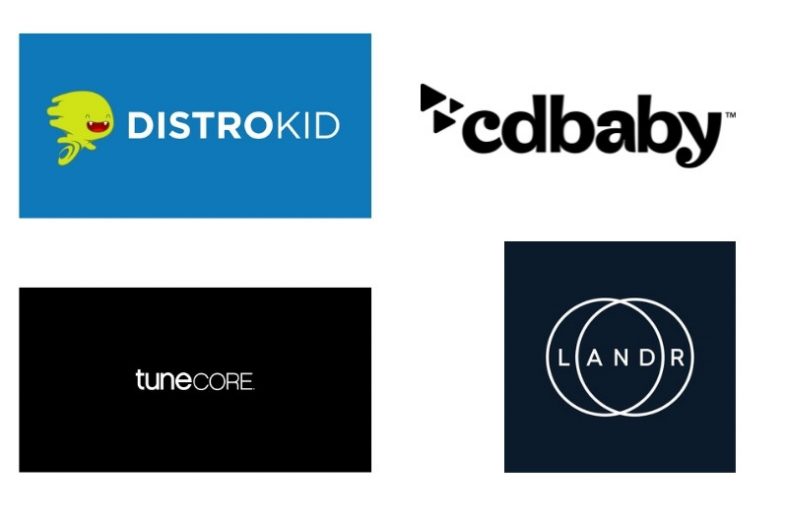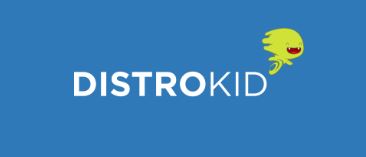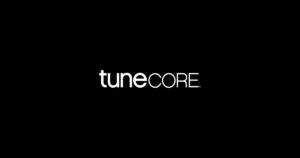The 10 Best Digital Music Distribution Companies (2024)

Digital music distribution companies are responsible for sending recorded songs (in digital format) to streaming websites such as Spotify, Apple Music, and Amazon Music. They handle submissions so you don’t have to deal with each music store or streaming services separately.
While old-school music distribution companies make music available to consumers by distributing physical records to physical stores, digital music distribution companies do the same by sending digital files (such as .wav, .mp3, and .flac files) to online streaming services.
Labels and musicians can currently choose between numerous digital music distribution companies, each with their own pros and cons. Since access to streaming services is a must for any musician in this day and age, I have listed the 10 best digital music distribution companies right now.
Contents
1. DistroKid

Pros
- Used by countless music pros
- No commissions
- Affordable despite its great reputation
- Fast and easy to use
Cons
- Some potentially confusing add-on fees
DistroKid is by far the world’s most popular digital music distribution company, reportedly used by a third of all labels and musicians. It’s easy to use, decently fast, and very affordable once you consider all of its benefits. It works with all the main online streaming services and offers add-on options for apps like Shazam.
What makes DistroKid great is the fact that you can upload unlimited songs for an annual fee that will cost you roughly as much as a Starbucks coffee. There are a few affordable plans for labels, too, depending on the number of artists distributed. The whole process takes a minimum of 10 days to complete.
Another crucial aspect of DistroKid is the fact that, unlike other digital music distribution companies, it doesn’t take commissions. This means that all the streaming royalties of a song are directly funneled towards the artist/publisher (you can learn more about how music royalties work here).
It’s hard to find flaws in DistroKid, but some users have criticized their relative lack of transparency towards add-on fees, which can sometimes be costlier than an annual subscription.
2. CD Baby
Pros
- Artists can edit their profiles directly
- Perfect for independent musicians
- High-quality marketing options
Cons
- Commission-based company
- Additional services can be costly
One of the strongest digital music distribution companies around, CD Baby takes pride in being a service mainly directed towards indie musicians. Simplicity and versatility are CD Baby’s two main strong suits, especially if you’re an artist who’s just starting and who’s releasing music without a label.
CD Baby is simple because it offers everything a musician needs without complicated add-on features (there are some available extras, though). It’s versatile because it allows musicians to access and edit their verified profiles directly. If you’re working with a different digital music distribution company, you might have to wait days for the smallest changes to your artist’s profile.
Marketing is another huge advantage of CD Baby, as the service is prepared to promote “unsupported” artists by getting the word out. However, there’s a clear financial motivation behind this aspect of the company – the fact it collects royalties.
CD Baby’s business model is commission-based, meaning the company will take a percentage (namely 9%) of their artists’ streaming royalties. Depending on the artist, this can be a game-changing disadvantage.
3. Tunecore

Pros
- Features an integrated social app
- No commissions (except for YouTube)
- Access to iTunes’ pre-release feature
Cons
- Payments are made on a song-per-song basis
- Tunecore discharges your music in case of payment delay
Tunecore is a great digital music distribution company, but it’s far from being the most affordable option around. Musicians get access to all the digital-music publishing and distribution services they could’ve asked for, they get to keep all their royalties, and they can even try Tunecore’s integrated social app.
However, Tunecore charges their clients on a song per song basis, and there’s also an annual subscription (which isn’t exactly low-cost) for Social Pro users. In addition, there’s a 20% commission fee exclusive to YouTube. If you miss out on any payment, your music is discharged by Tunecore, which can have massively negative consequences.
Despite all of this, Tunecore remains the number-one choice of many musicians and labels because it provides everything music pros need to distribute their music online, as well as a few extras such as access to iTunes’ pre-release feature.
4. LANDR
Pros
- All-in-one music platform
- Fast digital music distribution
- Terrific song mastering services
- Useful desktop app
Cons
- Digital music distribution is not LANDR’s strongest suit
- Can be challenging for beginners
You may recognize LANDR as a cloud-based music creation platform that offers a terrific online mastering service based on artificial intelligence. And while that’s still LANDR’s main focus, the company also features digital-music distribution services. Are these worth it, though?
LANDR can stand up against the competition by offering access to a lot of digital channels, prompt distribution, and a useful desktop app. It’s also often praised for its excellent customer support, which is great for musicians trying to learn more about the ins and outs of distributing their songs online.
LANDR does the job without being particularly impressive, though, especially if you consider the pluses of competitors such as DistroKid and CD Baby. In my opinion, you should opt for LANDR’s distribution services if you’re already a LANDR user. Getting samples, collaborating with other producers, mastering tracks, and uploading songs to streaming services all in one place is extremely convenient.
5. ReverbNation
Pros
- Great if you’re already a ReverbNation user
- High-quality music-publishing solutions
- Integrated Gig Finder app
Cons
- Too many paid extras
- Questionable customer support team
Pretty much like LANDR, ReverbNation isn’t just a digital music distribution company. ReverbNation’s main focus is to help music professionals create meaningful connections in the industry and sell songs. ReverbNation’s free accounts also offer a Gig Finder app, perfect for finding and promoting live performances.
For an affordable subscription, ReverbNation provides digital music distribution services, as well as administrative music-publishing solutions. If you already have a free or basic ReverbNation account, you should consider uploading to premium.
However, keep in mind that not everything is perfect in the ReverbNation world. The company is often criticized for trying to sell an abusive number of extras to its users. Most crucially, it once registered an underwhelming consumer rating of 1.74, most likely due to its inefficient customer support team.
6. Ditto Music
Pros
- Very affordable
- Perfect for labels
- Very fast withdrawals
- Includes analytic reports
Cons
- It takes some time to get a verified profile
- 10% YouTube commission
Ditto Music is a standout digital music distribution company because it offers highly competitive prices, especially for labels. While there are some paid extras, you can get access to everything you need (including unlimited songs and artists) for a very reasonable annual fee. Ditto Music is also praised for its prompt withdrawals, as artists and labels can get paid very quickly.
Ditto Music works with more than 200 outlets and doesn’t take streaming commissions. It manages copyright protection very diligently and provides useful analytic reports and pre-release features.
While payments are swift in Ditto Music, uploading new tracks to online streaming services can take some time, particularly if you want to create a new verified profile. Like other digital music distribution companies, Ditto Music also charges 10% of its users’ YouTube earnings; on the other hand, it has a partnership with Vevo Music.
7. AWAL

Pros
- Distribution to over 200 territories
- No complicated hidden fees
- Free UPC and ISRC barcodes
- Excellent reputation
Cons
- Commission-based company
- Doesn’t accept all artists
It’s fair to say that AWAL is the most exclusive digital music distribution company in the market. To join AWAL, artists first need to submit a request, and some queries can be rejected. The company’s goal is to work with well-established musicians with a decent online following and professional-sounding tracks. This is at the center of AWAL’s commission-based business model.
While it may not seem like it, AWAL is pretty simple. There are no hidden fees and sign-up payments, nor pricey annual subscriptions. After joining AWAL, artists simply need to let go of 15% of their royalties. And that’s all! While payments in commissions aren’t the best option for all musicians, AWAL’s payment process ensures that the company only makes many of its users also make money.
In terms of scale, AWAL is right there at the very top, with access to 100 digital partners (including iTunes, Spotify, Apple Music, Pandora, Google Play, and more) and a presence in roughly 200 countries. AWAL provides free UPC and ISRC barcodes, as well as a useful app where users can check all the information they need to manage their digital music distribution operations.
AWAL’s reputation is also worth noting, considering it is owned by Kobalt, one of the world’s leading music publishing companies.
8. Music Gateway
Pros
- High-quality syncing services
- Distribution to over 300 apps and websites
- All-in-one music services
Cons
- 25% sync right commission
Music Gateway is described as an “all-in-one music platform,” and the provided services are pretty impressive. This digital music distribution company is more than just that, as it also provides free mastering to its users. Music Gateway’s artists keep 100% of their royalties and have the chance to distribute their songs to over 300 apps and websites, including online streaming favorites such as Tidal and Amazon Music.
The signup process is very simple, and Music Gateway also accepts songs previously distributed by rival companies. In terms of reputation, Music Gateway isn’t as established as competitors such as DistroKid and CD Baby. So, what is it that makes it special?
Affordability is by far one of Music Gateway’s biggest advantages, but the company also offers excellent sync licensing services (you can learn more about syncing rights in this article). Having your songs in TV segments, shows, and commercials is by far one of the most profitable ways of making money as a musician.
With Music Gateway, all your sync licensing worries will be covered, even though you have to submit a 25% commission. Over the years, Music Gateway licensed songs for some of the biggest networks and studios out there, including Disney, ITV, BBC, and Universal.
9. RouteNote
Pros
- Ideal for beginners
- Switch between commission-based or track-per-track payments
- Sell music directly to the fans
- Excellent customer support team
Cons
- Withdrawals can take over a month
- Digital-music distribution can be painfully slow
If you find digital music distribution all too complicated, and you’re looking for an easy-to-use distributor to promote your first album, you should give RouteNote a try. While it’s advisable to pay for a premium account, you can try RouteNote’s services without paying a yearly fee.
RouteNote is often described as one of the simplest digital music distribution companies in the market, always available to answer any questions you may have about how things work. RouteNote’s excellent customer support team (available 24/7) is always there to answer any questions you may have. The company itself functions in the most transparent possible way, even allowing users to sell music directly to their fans.
RouteNote is perfect for beginners because it can be tested without any payment, but it’s not lacking in terms of advanced features. In other words, RouteNote is the perfect digital music distribution company for your music to grow; as a starting artist, you can get the free plan (you’ll have to pay commissions) and learn about the ins and outs of music distribution.
Later on, as your songs start to pick up some steam, you can use your revenue to upload to a premium package. RouteNote’s premium users don’t have to pay a commission, but rather a track-per-track fee.
There are some cons to RouteNote, though, especially if you don’t like to wait to have your songs online or a verified profile on the world’s best online streaming websites. Withdrawals can take up to 45 days – not ideal if music is your main source of income. In addition, having your songs on Spotify and other websites can take a whopping 3 to 4 weeks. For this reason, RouteNote isn’t the best digital music distribution company for labels or prolific artists working with a tight schedule.
10. Amuse Music
Pros
- The most affordable option around
- Designed to fit the needs of newly-released artists
- Fast Forward tool provides royalty payments in advance
Cons
- Not as well-established as some of its competitors
- No cover song licensing
As one of the newest players in the digital music distribution market, Amuse Music prides itself on being a free service. You can pay an annual fee to have a pro account, but you don’t need to.
A purely app-based company founded in Sweden, Amuse’s ideal clients are newly-released musicians looking for publishing, distribution, and even marketing services. Just like AWAL, the guys at Amuse Music only make money when their artists make money.
With Amuse Music, artists keep 100% of their rights and have the chance to rely upon the support of a company that seems to be genuinely interested in the success of its customers. Amuse users also have access to a helpful tool known as Fast Forward, which calculates royalty payments based on streaming data and releases the money to the artists in advance.
Amuse Music does not support mechanical rights for cover songs, which is one of the few disadvantages.
Make Sure to Choose Carefully!
It’s super important to pay close attention to the small print when you’re choosing a music distribution company. These types of companies are great at marketing themselves and will say all kinds of things to get you on board. But the real deal lies in the nitty-gritty details of their offerings. So, make sure to understand exactly what they cover and the services they provide before committing.
Verdict
For being extensively used by music pros all over the world and offering some of the most affordable solutions around, DistroKid is arguably the best digital music distribution company right now, especially if you’re not looking to share your streaming royalties with anyone. This is not to say every artist should go and buy a DistroKid subscription. Depending on different needs, different companies can suit your project better.
DistroKid works with so many artists and labels that it’s hard for them to be there for every single user. If you’re looking for a digital music distribution company that has your back and helps you every step of the way, alternative solutions – like the exclusive AWAL – may be a better option. If you need some extra services (such as mastering music), LANDR has got you covered.
In the end, choosing the best digital music distributor is about analyzing what your music requires and analyzing the available options very carefully.






